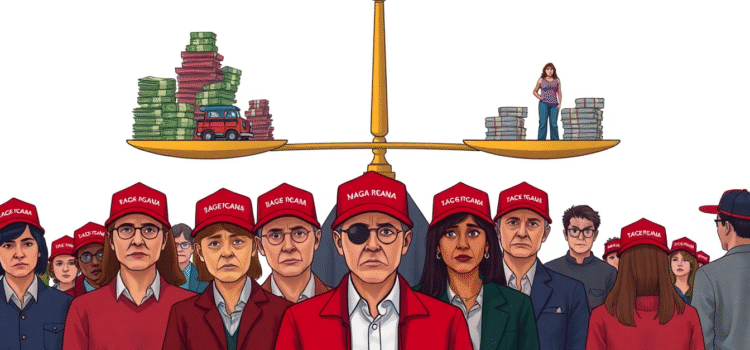
MAGA Supporters Criticize Trump’s Tax Bill: 60% Say It Favors Wealthy, Not Average Citizens
The political landscape is rife with debates, and among the myriad of topics, the controversy surrounding former President Donald Trump’s tax bill stands out prominently. A recent survey indicates that 60% of MAGA supporters, once the cornerstone of Trump’s base, believe that the tax reform enacted in December 2017 disproportionately favors the wealthy, leaving average citizens behind. This sentiment not only mirrors broader critiques regarding exacerbated economic inequality but also signals a notable shift in perception among Trump’s adherents. In this post, l will delve into the factors driving this criticism and explore the implications of the tax bill on economic disparity, political polarization, and the GOP’s tax policy.
Understanding the Criticism from MAGA Supporters on Trump’s Tax Bill
Originally introduced with the intent to streamline the tax code and foster economic growth through significant corporate tax cuts, Trump’s tax reform has been a topic of intense scrutiny. The promise of ‘trickle-down’ benefits has fallen short for many, particularly those within the MAGA movement who now question the real beneficiaries of this policy.
Artist’s depiction of economic inequality resulting from the Trump tax bill.
Economic Inequality and the Wealthy Tax Benefits
One of the core issues is the burgeoning economic inequality that results from the tax structure favoring corporations and affluent individuals. Economic analysts argue that the benefits of the tax cuts have not been evenly distributed. Instead, they appear to have exacerbated existing wealth gaps, leaving the middle class struggling to see tangible benefits.
Political Polarization in the USA
This criticism is not merely an economic concern; it deepens the political divide. As American citizens witness growing disparities, there is increasing polarization, questioning not only the efficacy of the tax policy but also its fairness. This discontent is mirrored within the GOP constituents who fear long-term political ramifications if perceptions of economic unfairness persist.
Impact on Middle-Class Tax Concerns and GOP Tax Policy
For many in the middle class, the promise of reduced tax burdens under Trump’s economic policies seems elusive. Instead, the perceived advantage enjoyed by the wealthy continues to fuel dissatisfaction. Concerns over losing the support of the core GOP base have prompted calls within the Republican Party for a reevaluation of their stance on tax policies.
- The GOP must address middle-class disadvantages potentially exacerbated by this tax legislation.
- There is a growing divide within conservative circles over whether the economic benefits justify increased inequality.
- Addressing political polarization requires sincere dialogue and potential policy adjustments.
The Broader Tax Reform Debate
The debate over Trump’s tax bill serves as a microcosm of a larger conversation on economic fairness in America. Are tax policies favoring growth or simply benefiting a select few? This remains a contentious issue that demands careful scrutiny and public discourse.
Conclusion: A Call for Reevaluation and Public Engagement
The criticism from MAGA supporters underscores a critical need to reassess the long-term impacts of Trump’s tax bill. While initial intentions might have been growth-focused, the reality for many average citizens has been different. Encouraging open dialogue in the comments section can help bridge understanding and bring forward solutions that more equitably distribute economic benefits.
Sources
CNBC.com – MAGA Backlash Against Trump’s Tax Bill
NYTimes.com – More Criticism of Trump’s Tax Reform
WashingtonPost.com – MAGA Supporters Disapprove Trump Tax Cuts
FAQ
What is the main concern MAGA supporters have with Trump’s tax bill? Maga supporters express that Trump’s tax bill primarily benefits the wealthy, rather than average citizens, which raises concerns about increasing economic inequality.
How has the tax bill impacted the middle class? Critics argue that the tax reform has failed to deliver promised savings to the middle class, instead providing a greater advantage to corporations and affluent individuals.
What are the political implications of this dissatisfaction? The criticism has contributed to political polarization within the USA, with implications for GOP policies and future elections, particularly regarding economic fairness.
What steps could address these criticisms? Engaging in meaningful policy revisions and open dialogue among constituents could help address disparities and refine tax policies for broader benefit.








Comments